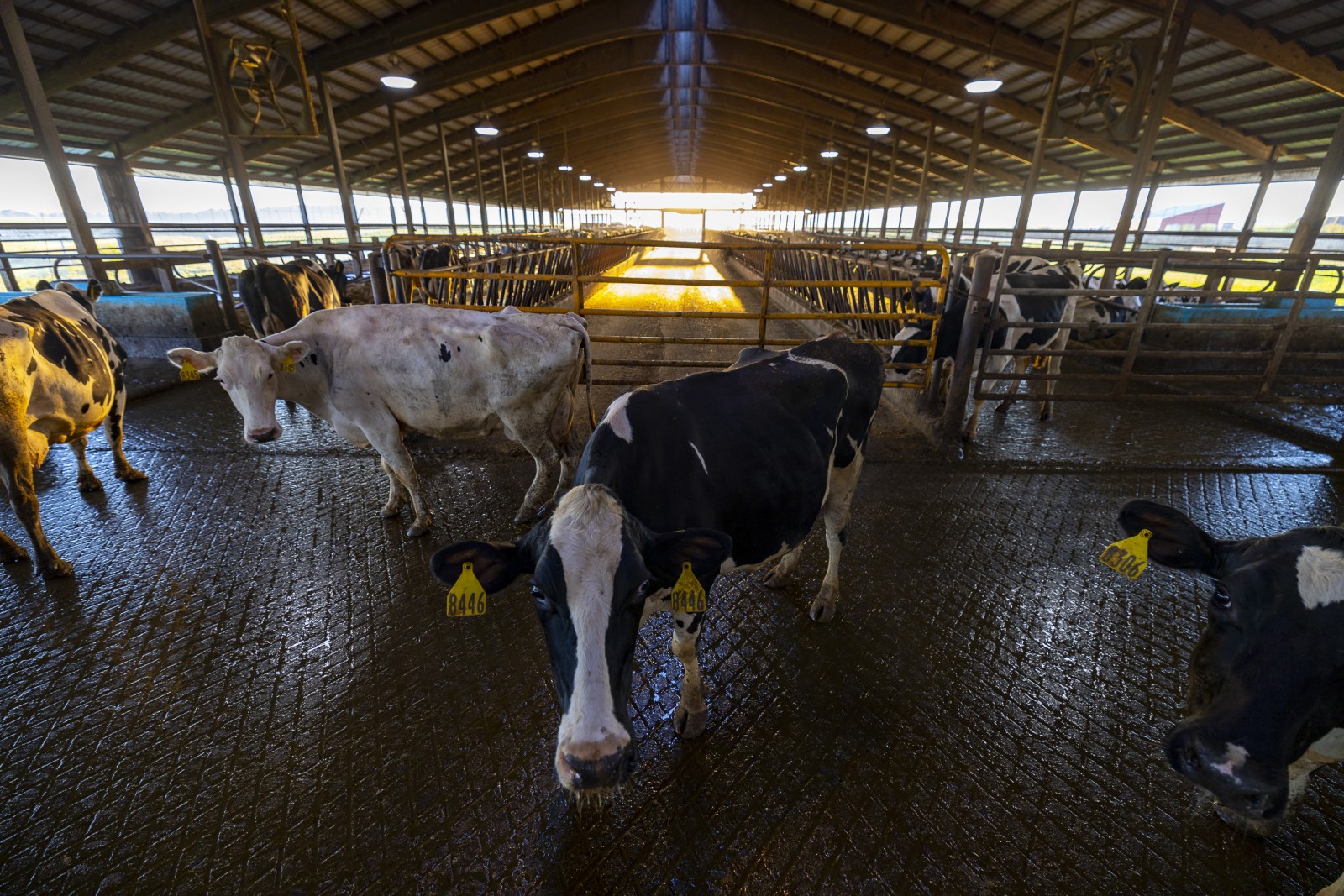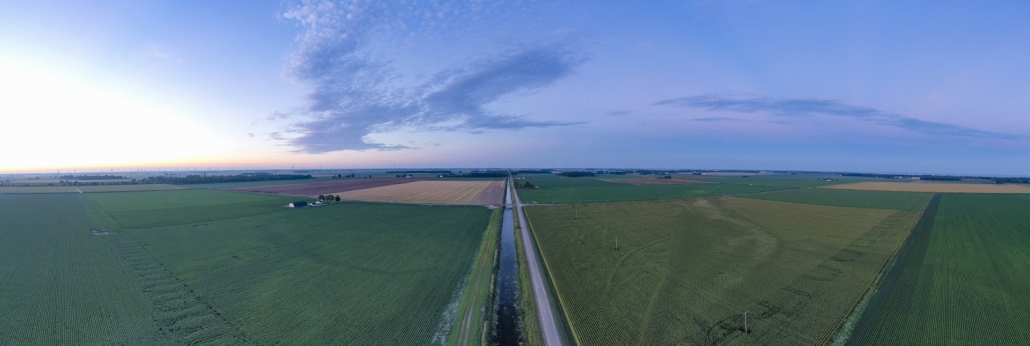
Photo © J. Carl Ganter/ Circle of Blue
By Kelly House, Bridge Michigan
- Michigan regulators want more limits on manure pollution from the biggest livestock farms
- Farm groups allege the changes are too dramatic for regulators to make without outside review
- The state Supreme Court is weighing the case, which could have far-reaching implications for Michigan’s ability to regulate pollution
It began with a debate about how to dispose of the copious manure generated by Michigan’s largest livestock operations, which raise chickens, pigs and cows by the hundreds and thousands.
But the legal fight has since reached Michigan’s highest court, with potentially far-reaching implications for the state’s ability to limit pollution of all kinds.
At issue: How much the Michigan Department of Environment, Great Lakes and Energy (EGLE) can change pollution permits without a lengthy rulemaking process requiring legislative consent.
EGLE is charged with making sure industries don’t emit excessive pollution into Michigan’s air, land and water. It has the power to issue permits to enforce environmental laws.
But the Michigan Farm Bureau and other agricultural interests argue EGLE went too far in 2020 when it changed permit requirements to reduce manure pollution by confined animal feeding operations (CAFOs), which are large livestock operations where animals are raised in close quarters instead of a pasture.
The farm interests brought suit, asserting that the new manure disposal limits go beyond routine permit tweaks.
“The agency has, in fact, changed the law,” Zach Larsen, an attorney for the group, told the seven Supreme Court justices who heard the case on Thursday.
Larsen argued that EGLE can’t make the changes to permit requirements without initiating a rulemaking process that involves weighing the costs and benefits, holding new public hearings and getting legislators’ blessing.
The case has environmentalists concerned. Citing a 2004 law that bars EGLE from making almost any new water quality rules, they say a ruling in favor of the farm group could render EGLE powerless to rein in CAFO pollution at all.
“The effect,” said Robert Michaels, an attorney with the Environmental Law & Policy Center, “is to freeze a failing permit in place.”
The case comes as Michigan, Ohio, Indiana and Canada struggle to address the agricultural pollution that sullies lakes and rivers across the region, and turns Lake Erie bright green with algae every summer.
In an interview last month with Bridge, Michigan’s top agricultural regulator acknowledged the state is failing in its commitment to reduce phosphorus loads into Lake Erie by 2025.
Manure runoff from CAFOs is part of the problem. The industry has expanded threefold in Michigan since the turn of the millennium, and now numbers some 291 operations. They generate hundreds of millions of tons of solid manure and billions of gallons of liquid manure and urine each year.
For perspective, state Assistant Attorney General Elizabeth Morrisseau told the court on Thursday, that’s the volume of “more than 24-and-a-half Deepwater Horizon spills every year.”
CAFOs typically dispose of manure by spreading it on farm fields. At low enough levels, it fertilizes crops. But studies show that farms increasingly saturate fields with more than plants can absorb. The manure then seeps into waterways, polluting them with bacteria and nutrients like phosphorus and nitrogen.
Because they produce such high volumes of waste, CAFOs are regulated more like factories than farms. They require waste disposal permits that are updated every five years.
Arguing permit terms in place since 2015 were not sufficiently controlling pollution, EGLE added several new conditions in 2020. It required grassy buffers along surface water bodies. It ramped up reporting requirements. And, with some exceptions, it banned the state’s largest CAFOs from spreading manure on farm fields from January through March — something EGLE spokesperson Hugh McDiarmid called an “environmentally risky practice” that can cause liquid manure to stream off frozen fields.
But farm operators say those conditions will be too costly. Adam Cornell, who raises pigs in Mecosta County, told Bridge Michigan he wants to pass the family farm onto his children, but he fears being “regulated out of business” first.
Instead of “changing the whole rulebook,” he said, the state should more aggressively regulate farms that aren’t complying with the old rules.
A coalition led by the Farm Bureau mounted an administrative challenge in May 2020, arguing the new permit went too far. Environmentalists intervened, arguing it didn’t go far enough.
EGLE volunteered not to enforce the new permit terms until the dispute was settled.
But before an administrative law judge could rule, the farm interests filed a separate lawsuit in August 2020 challenging EGLE’s ability to change the permit without going through rulemaking.
The Michigan Court of Appeals agreed, prompting the state’s appeal to the Supreme Court.
State lawyers argue that farm interests had no right to sue while an administrative law judge was already scrutinizing the permit. And they contend EGLE had both a right and a duty under the state’s Natural Resources and Environmental Protection Act to better control CAFO pollution.
“State law, in fact, compels EGLE to change permits that don’t work,” Morrisseau told the justices.
Justices on Thursday gave little indication about how they may rule. The court could decide whether EGLE’s permit requirements must go through the rulemaking process, or the justices could make a narrower ruling on whether the Farm Bureau had a right to bring its suit.
Environmental groups say they fear that a ruling in favor of the Farm Bureau would bar EGLE from being an effective pollution watchdog.
The state issues similar pollution permits to a host of industries, updating requirements as needed. If every significant update must go through rulemaking, argued Michaels, with the Environmental Law and Policy Center, pollution could fester while EGLE waits for permission to act.
The Great Lakes News Collaborative includes Bridge Michigan; Circle of Blue; Great Lakes Now at Detroit Public Television; and Michigan Public, Michigan’s NPR News Leader; who work together to bring audiences news and information about the impact of climate change, pollution, and aging infrastructure on the Great Lakes and drinking water. This independent journalism is supported by the Charles Stewart Mott Foundation.




